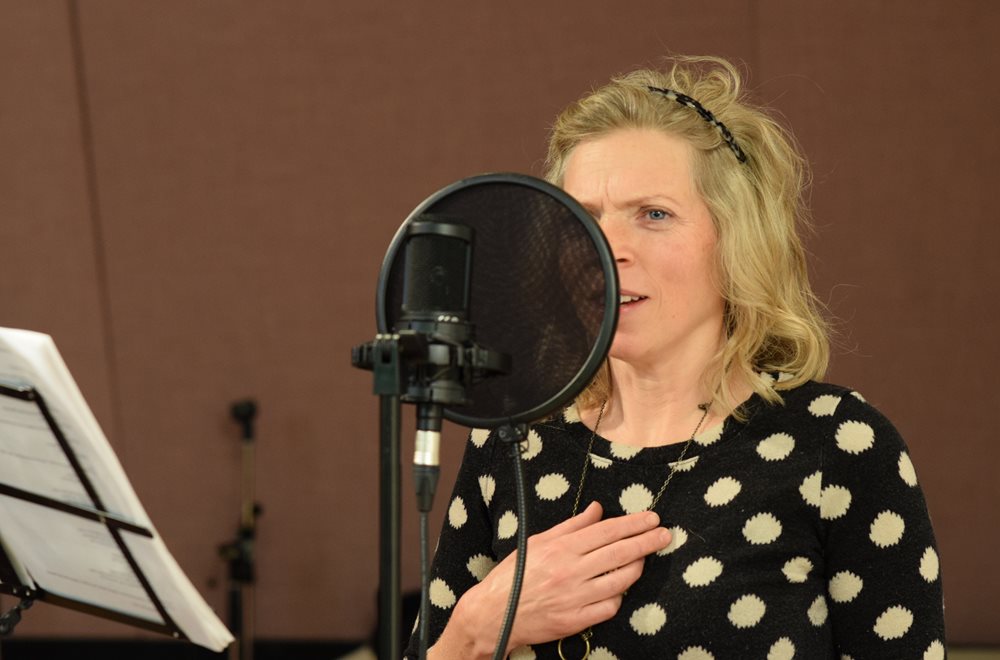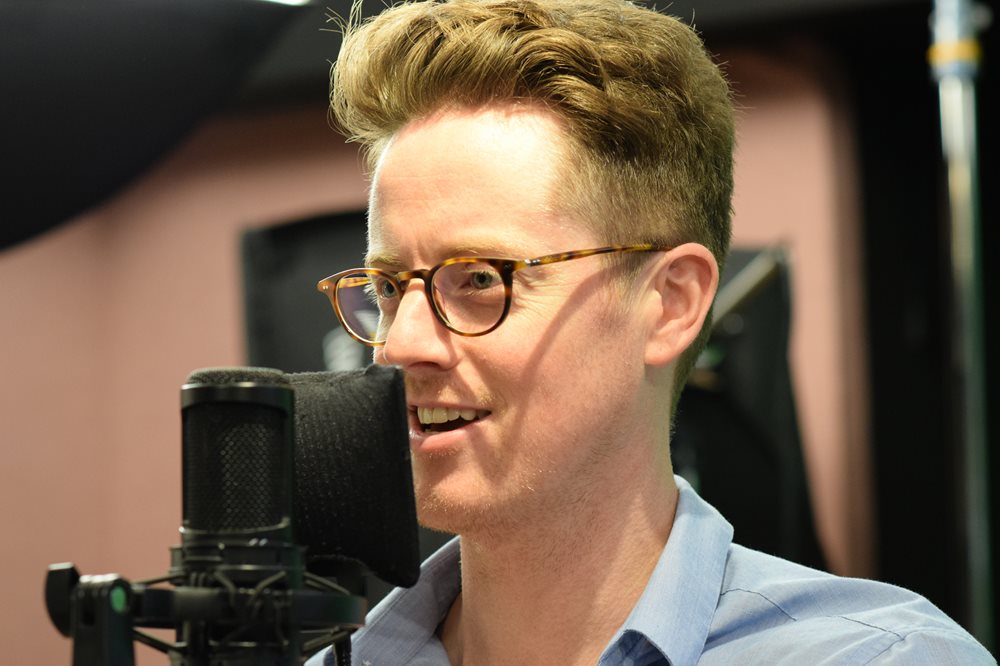Featured Story
November 2018
 Actor Liisa Repo-Martell records What A Young Wife Ought To Know by Hannah Moscovitch as part of PlayME. Photo by Alvaro Acosta.
Actor Liisa Repo-Martell records What A Young Wife Ought To Know by Hannah Moscovitch as part of PlayME. Photo by Alvaro Acosta.
“We have fun, accessible, light comedies and some incredibly hard-hitting work as well,” says Chris Tolley of the upcoming season of PlayME by Expect Theatre, a podcast series of audio dramas produced with co-creator Laura Mullin.
This second season of the podcast is being picked up by CBC Podcasts, a huge accomplishment for the duo. “We’re very happy to be adding to the legacy of radio drama at the CBC, and to be providing a platform for Canadian playwrights and actors,” says Mullin. “[CBC Podcasts] will give us an opportunity to share stories and work from across the country, really breaking down the geographic silos that we often find ourselves working in,” adds Tolley.
When choosing works to record, the duo looks for plays that are strong, feature engaging characters, and tell stories from a unique perspective. The new season showcases five Canadian plays including: Prairie Nurse by Marie Beath Badian, a comedy about two Filipino nurses who come to work at a small-town Saskatchewan hospital in the late 1960s, What a Young wife Ought to Know by Hannah Moscovitch, a love story set in 1920’s Ottawa during the Canadian birth control movement, the award-winning Huff by playwright Cliff Cardinal which explores life on a reservation, The Fish Eyes Trilogy by Anita Majumdar, which looks at the lives of three young Canadian women in Port Moody, BC, as they navigate issues of consent, cultural appropriation and colonialism, and Between Breaths by Robert Chafe, which profiles the story of a Newfoundland man who rescued numerous whales entrapped in fishing nets.
 Actor David Patrick Flemming records What A Young Wife Ought To Know by Hannah Moscovitch as part of PlayME. Photo by Alvaro Acosta.
Actor David Patrick Flemming records What A Young Wife Ought To Know by Hannah Moscovitch as part of PlayME. Photo by Alvaro Acosta.
Tolley and Mullin both have experience working at CBC Radio’s drama department and are playwrights, producers and directors of theatre. They created PlayME to overcome the ephemeral element of theatre where often artists will work tirelessly on creating a show that has a mere one or two-week run. PlayME was an opportunity for them to merge their love of theatre and podcasts into a new form: audio drama.
With funds from Toronto Arts Council’s Open Door program, which provides support for big ideas and initiatives that have the potential to create transformative change for the arts sector, Tolley and Mullin were able to produce the first season of PlayMe. “It was really the Open Door grant that gave us the seed money to be able to go from an idea into actually producing our very first shows,” says Tolley.
Listening to theatre through headphones or in the privacy of ones home is much different than seeing a show on stage. With no set, lighting, or actors to look at, it’s up to the listener to infer and visualize the characters and place they’re immersed in. Audio drama is highly personalized, explains Mullin. “You have the voices right inside your ears, and that gives you an intimacy that you really can’t capture with theatre. You can hear actors whispering, you can hear them breathe, and it just gives the actors so much more opportunity for range as well,” adds Tolley.
Not only is the experience different for the audience, it’s different for the creators of the plays themselves. Audio drama puts an emphasis on the written word says Mullin: “We’ve heard playwrights say that when they sit in the recording session, they hear their play differently because there’s no blocking, there’s no sets or lighting, and it really comes down to the story.”
The idea is not to take away from live theatre, but to enhance it by enabling Canadians and international audiences to get a taste of what’s happening in local theatres across the country. It’s about building audiences, many of which are listening from outside of Canada. It’s not a surprise to Tolley and Mullin that PlayME has been embraced outside of our border. Canada’s diversity and wealth of talent explains this: “Ultimately I think that people will listen to quality work regardless of what country it comes from,” says Tolley.
Learn more about PlayME by visiting www.playmepodcast.com
PlayME can be accessed on the CBC Podcast website: CBC.ca/playmeCBC
Public funding for the arts helps to support big ideas and initiatives like PlayME. Let your political representatives know that you support the arts.